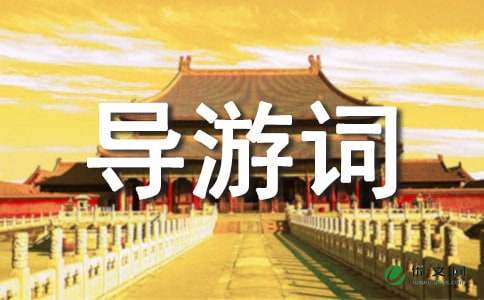豫园英文导游词
豫园(Yu Garden)位于上海市老城厢的东北部,北靠福佑路,东临安仁街,西南与上海老城隍庙毗邻,是江南古典园林,始建于明代嘉靖、万历年间,占地三十余亩,
豫园英文导游词
。下面是关于豫园英文导游词范文,希望对大家有帮助!
豫园英文导游词
Location:
Yuyuan Garden, located in the southern part of Shanghai, is a famous classic garden. It is characteristic of the architectural style of the Ming dynasty.
History:
1. Pan Yunduan, once an official of Sichuan Province, there is another saying that he was a treasurer, had the garden built to please his parents. The garden’s name “Yu” means “Pleasing one’s parents”.
2. The construction started in 1559 but went on and off for lack of money and did not complete until twenty-eight years later.
3. Some businessmen bought it at a low price and later make it the City God Temple’s West Garden. During the Opium War and the Taiping Revolution, it was occupied and experienced a lot of disasters, so it lost much of its former grandeur. After the liberation of Shanghai, the people’s government makes many renovations to Yuyuan Garden and it opened to public at last in 1987 with a totally new look.
Main spots:
Before entering:
There is a beautiful lotus pond. Across the pond is a bridge with a pavilion in the middle which is called the Mid-Lake Pavilion. It was rebuilt in 1784 and was converted into a teahouse 80 years ago. The old teahouse is one of the most famous in Shanghai, and was visited by Queen Elizabeth II and Bill Clinton among others.
By the teahouse is a nine zigzag bridge.
Don’t miss the Mid-Lake Pavilion Teahouse next to the entrance of the Yuyuan Gardens and now one of the most famous teahouses in China, visited by Queen Elizabeth II and Bill Clinton among others.
Six scenery area:
One: The Huge Rockery scenic area.
Zigzag bridge:
A zigzag bridge is one method for garden building.
It slows down visitors’ pace so that they may enjoy the scenery leisurely and it also enables them to have a different view whenever they make a turn.
Why nine zigzag? It is because “nine” is the biggest digit before ten and is a lucky number.
On special occasions such as the Lantern Festival, which falls on the 15th of January of the lunar calendar, celebrations are held in the vicinity, giving rise to much hustle and bustle.
It was a private garden in the southeast of Shanghai, with a history of more than 400 years. The Garden features more than 30 halls and pavilions such as Spring Hall, Chamber for Gathering the Rain and Pavilion for Viewing Frolicking Fish. They look out on pools filled with multicolored carp and lotus, artificial but climbable mountains, a Grand Rockery, dragon-shaped walls and winding corridors.
The owner of the garden, Yunduan Pan, once a treasurer of Sichuan Province in the Ming Dynasty, had the garden built after the imperial type in Beijing to please his parents in their old age. Hence the name of the garden "Yu", which means "pleasing one's parents".
The construction started in 1559 but went on and off for lack of money and did not come to completion till twenty years later. Unfortunately, Pan's father did not live to see the garden completed. What's more, the Pans went down the drain and his descendents were eager to sell the garden. Some businessmen soon bought it at a low price. Then, it was incorporated into the City God Temple to become its "West Garden", and alter turned into many trade gild offices. In the mid-1800s the Society of Small Swords used the Garden as a gathering place for meetings. It was here that they planned their uprising with the Taiping revolutioners against the French colonialists. The French destroyed the Garden during the first Opium War. So, the garden experienced repeated calamities in its history and lost much of its former grandeur. But the area was later rebuilt and renovated.
Yu Garden is divided into six parts with many scenic spots: Three Corn-Ear Hall and Grand Rockery; Happy Fish Waterside Pavilion and Chamber of Ten Thousand Flowers; Spring Hall and Hall of Mildness; Scenery Gathering Tower, Toasting Pavilion and Nine-lion Study; Exquisite Jade Stone and the Inner Garden.
Each part of Yu Garden is separated by a white brick wall, the top of which are decorated with dragons. Each part of the park, although divided, has a balance and harmony creating a unity of expression.
Yu Garden is a piece of Shanghai past, one of the few old sights left in the city. Everyday at least 10,000 people visit the garden. No wonder people say "Those who came to Shanghai but missed Yu Garden and the City God Temple Bazaar can not claim that they have been to the city."
【豫园英文导游词】相关文章:
4.泰山英文导游词
5.天津英文导游词
6.韶山英文导游词
7.上海英文导游词
8.乌镇英文导游词